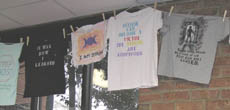“I want people who don’t acknowledge or are not aware of sexual assault to come into the building and be aware of the truth that’s out there,” said senior Kat Spangler, who first proposed bringing the Clothesline Project to Guilford. On display in the Underground are 75 t-shirts, made on campus, with messages of deep emotion from men, women, survivors, and friends of assault victims. This is the Clothesline Project.
Spangler first saw the project displayed at the DeKalb Rape Crisis Center in Decatur, Ga., where she worked as an intern. She thought it would be a great idea to bring it to Guilford.
Spangler sent e-mails to the RA’s to propose the idea of the Clothesline Project and ask for help.
“Kat had invited all the RA’s on campus to participate, and I jumped at the chance,” said junior and RA Sarah Everette via e-mail.
Director of Gender Issues and Health Coordinator Sandy Bowles and Kathyrn Schmidt, Associate Professor of Sociology/Anthropology, helped Spangler coordinate the plans for the project.
The Clothesline Project aims to speak out against sexual assault and rape and allows people an outlet and safe space in which to do so.
“To me, it means healing,” said junior Cori Parmenter via e-mail. “I am not a survivor, but so many of the people closest to me are.”
“It’s also a chance for them to see that they’re not alone,” said junior and co-organizer Samantha Kittle.
The project is domestically and internationally spreading to universities and campuses everywhere. Kittle, who saw the project here at Guilford as a prospective student, heard Spangler pitch the idea at a Women’s Studies meeting one night and helped plan with her.
Rachel Cary-Harper – a visual artist and member of a women’s rights group on Cape Cod, Mass. – began the project, according to clotheslineproject.org. After being moved by the AIDS quilt, she decided to start a t-shirt project by hanging shirts exhibiting sexual violence and rape awareness on a clothesline.
Cary-Harper introduced the first project display in Oct., 1990. The display had 31 shirts and took place in Hyannis, Mass, as part of a “Take Back the Night” rally and march.
Currently, there are 500 projects nationally and internationally in 41 states and 5 countries. According to clotheslineproject.org: “It is the very process of designing a shirt that gives each woman a new voice with which to expose an often horrific and unspeakable experience that has dramatically altered the course of her life.”
Guilford’s Clothesline Project stems from the Vagina Monologue performances, continuing the message of awareness and acknowledgment of gender violence, rape and assault.
“I read a passage that once that said, ‘If you think you don’t know anyone who has been raped, then someone you care about has something to tell you.’ This is just proof of that,” said Everette.
“It’s for men, too – about their experiences and their friends’ experiences,” said Kittle.
Originally started for women and their voices, Guilford’s project wanted to include the male perspective as well.
“I feel that it is important to recognize the fact that men can also be, and often are, victims of sexual abuse and assault,” said sophomore Tim Scales via e-mail. “I wanted to contribute to the project to represent this side of the issue.”
There were three locations on campus where the t-shirts were made: King Hall, Milner Hall and Mary Hobbs Hall.
“We tried to create safe environments for the women and men to make their shirts,” said Spangler.
“When I was making my shirts, it felt so good to be making a statement about these ‘scars’ that I have been carrying around,” said Parmenter.
Besides Kittle, both Everette and junior Leise Gergely had seen the Clothesline Project as prospective students a few years back.
“I remember, even then, being enthralled” said Gergely. “Since then, there have been some events in my life that have made me more passionate about being involved. And so here I am.”
For more information, visit the Underground in Founders Hall or visit www.clotheslineproject.org.

